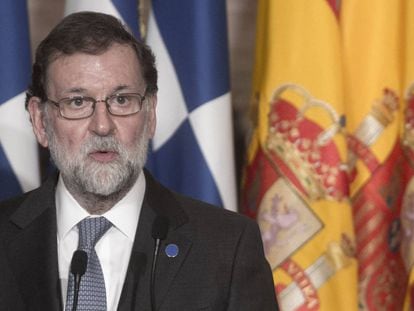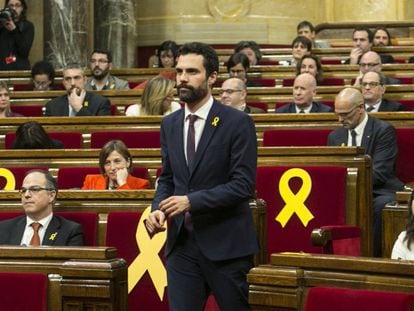Supreme Court rejects European arrest warrant request for Puigdemont
Judge sees deliberate provocation in ousted Catalan premier’s trip to Copenhagen despite risk of arrest

Spanish Supreme Court Judge Pablo Llarena on Monday denied a request from prosecutors to activate the European arrest warrant for Carles Puigdemont.
The move came after the ousted Catalan premier landed in Denmark on Monday morning despite the risk of his arrest. According to sources in the prosecutor’s office, the arrest warrant was only to be applicable in Denmark.
Puigdemont flew to the Danish capital to attend a conference at the University of Copenhagen. It was the first time in 80 days that the sacked premier had left Brussels, after fleeing there in November to avoid charges of sedition, rebellion and misappropriation of public funds over the illegal independence push in Catalonia.
The Danish government has refused to comment on the issue
The trip took place shortly after the Speaker of the Catalan parliament, Roger Torrent, nominated Puigdemont to be the next Catalan premier despite the latter’s legal situation. The chamber is controlled by a separatist majority in the wake of the December 21 elections.
Prior to the warrant denial, the Danish government had stated that the issue of Puigdemont’s arrest was a subject for the Danish judicial system. At a press conference, Danish Minister for Foreign Affairs Anders Samuelsen avoided answering whether the situation had put the government in an uncomfortable position: “I heard the news when I got here that he had arrived in Copenhagen, but this really does not correspond to my department. It is for the Justice Ministry. I have no comment.”
In Denmark, the crimes of rebellion or sedition “are punishable with reviewable life sentences,” according to the Spanish prosecutors’ warrant request.
A provocation
In a writ, Supreme Court Judge Llarena, who is handling the rebellion probe, said that the likelihood that Puigdemont traveled to Denmark for academic purposes was “remote,” and instead viewed Puigdemont’s trip as a “provocation” to get himself arrested. This would give him an excuse for being absent at an upcoming session in the Catalan parliament to choose the next premier.
Parliament lawyers recently confirmed that candidates to the post must be physically present at the debate, according to the chamber’s procedural rules. Puigdemont’s attempts to get himself sworn in remotely or by proxy from Brussels have been questioned by even his top ally, the Catalan Republican Party (ERC), whose leader Oriol Junqueras is in pre-trial detention in connection with the same criminal investigation that Puigdemont has so far eluded.
“It is striking that a fugitive from justice should reveal his plans to travel from his initial refuge, and to proclaim the exact location where he is going to be,” wrote Judge Llarena. In the judge’s view, this attitude “has no other aim than to seek out his own arrest. (…) Faced with the legal impossibility of getting invested without showing up inside parliament, the provocation of an arrest abroad would give [Puigdemont] a justification that his absence is not a free decision as a fugitive from justice, but the result of an imposed situation.”
The judge added that he will reactive the European arrest warrant if Puigdemont does not return to Spain, but suggests that he will not do so until a new Catalan government has been formed.
In December, Spain’s Supreme Court withdrew the European arrest warrant for Puigdemont amid concerns that the involvement of the Belgian judicial system could hamper attempts by the Spanish courts to try Puigdemont for rebellion, the most serious crime for which he is being investigated, and one that carries a maximum sentence of 30 years.
The Spanish crime of rebellion does not have an exact equivalent in Belgium, a fact which could have seen Belgian authorities handing over the sacked politician to Spanish authorities on charges such as misuse of public funds, but not on charges of rebellion. This in turn would have prevented the Spanish courts from trying Puigdemont and the former ministers who fled with him for that crime.
English version by Melissa Kitson.












































